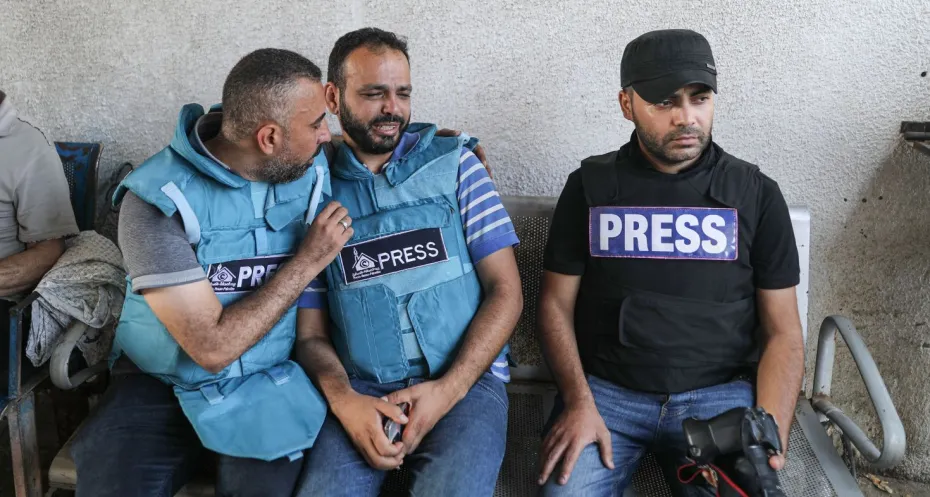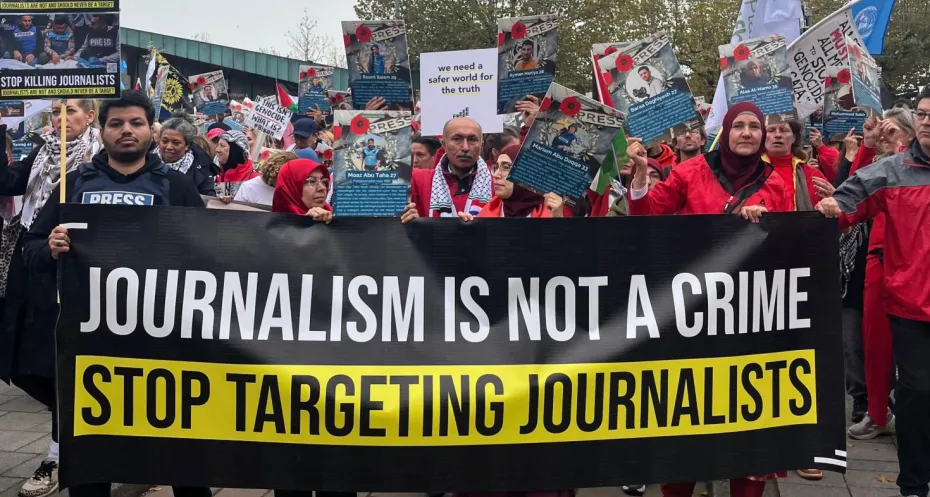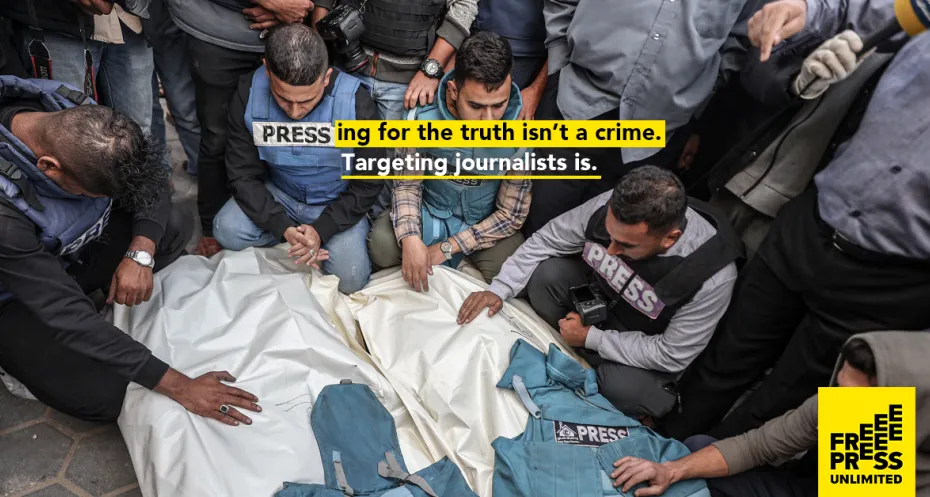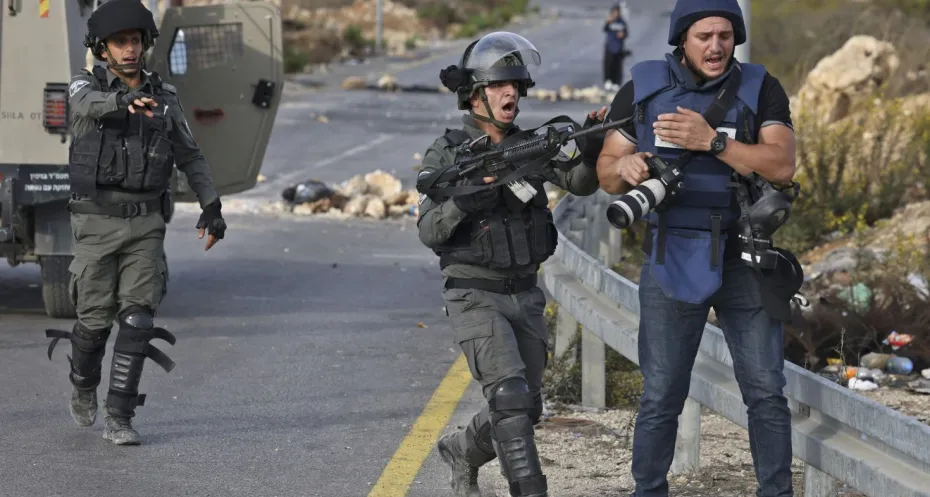Safety of journalists and media coverage in Israel & Palestine

Our mandate is to protect journalists in situations of conflict and repression. Under international humanitarian law, journalists are civilians and should be treated as such by the warring parties. In recent years, the protection of civilians has been violated in most of the conflicts that emerged. In this conflict we see very problematic trends and exceptional violence appearing towards journalists and independent media that should concern everybody.
Protection
In the Gaza strip, the past weeks have been reported to be the deadliest weeks for journalists since international Press Freedom groups started documenting it. As reported by the Committee to Protect Journalists, between 7 October 2023 and 11 February 2024, 85 journalists have been confirmed dead: 78 Palestinian, 4 Israeli, and 3 Lebanese. In addition, 16 journalists have been reported injured, 4 journalists were reported missing and 25 journalists were reported arrested. On top of that, the premises of several media outlets in Gaza have been struck. The headquarters of the local independent newspaper Al-Ayyam, located in the Palestine Tower in Gaza, was completely destroyed in an Israeli strike targeting the building on 7 October and the Gaza branch of Ma’an was also damaged by a strike. All these killings and attacks need to be thoroughly investigated, we are distraught by reports that journalists were shot while reporting and several media outlets were hit by missile attacks. Journalists are to be considered civilians during conflict, serving an essential public need for reliable and timely information.
We know from the situation on the ground that journalists are lacking everything in terms of capacity to report, there is lack of power supply, lack of connectivity, lack of protective gear and like all other civilians, they are facing shortage of food and water supply. However, it is impossible to get anything in and out of Gaza, let alone supplies for journalists at risk. Free Press Unlimited supports a call for cease fire that all of the international human rights agencies at the level of the UN and the international emergency response groups are asking for.
News gathering and working conditions
Journalists covering the recent violence are performing their duties under high pressure. Israel is continuously bombing Gaza, attacking not only Hamas targets but also striking civilian targets. Importantly, it is mainly local journalists performing these tasks but there are some international journalists on the ground as well. Estimates published by the Government Press Agency estimate that more than 2000 journalists have flocked to Israel to cover this conflict. But they have no access to the Gaza strip, as international journalists are prevented by Israel from entering Gaza through the main Erez crossing.
The courage of journalists in Gaza that continue reporting is incredibly admirable. It is thanks to those local journalists that we are witnessing somewhat what is ongoing on the ground. That is why we call on both the Dutch government and the international community to exert pressure on the parties to uphold their responsibility to protect journalists on the ground and allow them to continue to do their job to provide reliable information to the public. This also means ensuring access to communications infrastructure and supporting efforts to restore them.
While journalists are doing their work, their family members are continually under attack. Al Jazeera journalist Wael Al-Dahdouh learned on air that his family had been killed by an airstrike, soon after moving them south of Gaza city after an evacuation order by the Israeli Defence Forces (IDF). Dahdouh’s family was reportedly sheltering in a refugee camp when a blast killed them. It shows the kind of personal sacrifice journalists are making in this conflict.
In Israel too, journalists face serious threats when asking critical questions about the large-scale violence or expressing empathy or solidarity with the people of Gaza. There are reports of journalists who are attacked by mobs, journalists that are assaulted by Israeli police, and intimidated while reporting. We are also concerned about the ongoing pressure on journalists and media by Israeli government measures. On October 16, Israel proposed new emergency regulations that would allow it to halt media broadcasts if their output is seen to harm “national morale”. We fear that this rather vague and undefined new legal measure will be used to censor public debate in Israel. The Israeli government has already threatened to close Al-Jazeera’s local offices under this proposed rule, and to block the global news outlet from freely reporting on the war. Together with all other international press freedom organisations, we are united in saying Israel should refrain from such actions.
Our colleagues from Reporters Sans Frontieres (RSF) have made a preliminary report about the death of a Reuters journalist in Lebanon and conclude it is likely a targeted attack. This is a stark reminder of the death of Shireen Abu Akleh, an Al Jazeera reporter who was killed by targeted fire of Israeli soldiers in Jenin, the Westbank, according to several independent investigations including by Bellingcat, Forensic Architecture and the Washington Post. Since 2019, Free Press Unlimited has worked to end impunity for journalist murder in its project “A Safer World for the Truth”. In many countries of the world, we found that investigations are often diluted by a lack of independence of investigations or a lack of specialized investigative capacity by authorities. This is why Free Press Unlimited calls for independent, transparent and credible investigations in cases of journalist murders where local authorities are negligent in this regard. That should happen also in the case of the targeted journalists in this conflict.
Access to fact based information and the spread of disinformation
There is a popular saying that the first victim of any war is the truth. Indeed in situations of war, massive propaganda efforts are taking place and the public should be aware of it. Independent information provided by journalists is essential to understand what is happening, only through them does information come out that is not provided by either the Israeli government or Hamas. However, all kinds of methods are being used to restrict access to information in both the Palestinian occupied territories as well as in Israel. Information becomes part of the warfare conducted by the parties. Where there is a lack of independent journalism, citizens are dependent on divisive narratives or propaganda. Furthermore, the lack of information creates chaos among people because they do not know what is happening, and it complicates the collection and dissemination of evidence, making it easier to evade accountability for human rights abuses.
In Gaza, the Israeli government has deliberately cut off communication channels. On October 9th, the two main telecommunication providers in Gaza were bombed, cutting off the civilian telecommunication infrastructure. In addition, other internet service providers were impacted by airstrikes, with damage to infrastructure causing widespread outages in both internet and telephone line access. On top of that, there are increasing electricity cut-offs. This makes it increasingly difficult for journalists to do their job, and for citizens to access reliable information. Or to even find out if their loved ones are still alive.
In recent weeks, both the Israeli government as well as Hamas have started an information campaign to gain support where the unprecedented suffering of civilians in this conflict has been highlighted by both sides. Over 100 journalists were invited by the IDF to watch images of the Hamas attack in Israel and Hamas is widely sharing images of victims of Israeli bombing on their online channels; both are attempts to win the “narrative battle”.
On top of this, we have seen a wide digital campaign of censorship, online harassment, doxxing and shadowbanning on social media. So far, social media companies have failed to address the alarming levels of disinformation and online violence on their platforms, which are contributing to offline violence, dehumanization, and justifying attacks against civilians.
Bias in media coverage
The media plays an important role in shaping our perceptions, and why our societies care about some crises and some victims more than others. We are especially witnessing this in the current events in Israel and Palestine. The media’s choice of words, and its decision to humanize one side above the other, to label one the aggressor and the other the victim, creates a divisive narrative.
In some media coverage, Palestinians “die” while Israelis are “killed”. Palestinians interviewed on US or British TV asked to condemn Hamas, while Israelis aren’t asked to account for their government’s crimes. Rather than explaining the history of 75 years of occupation, Israel's response is merely described as a retaliation or response to the Hamas attack, or their right to defend themselves.
Increasingly, discussions are taking place within the media about framing and the language that is used. "So why is media coverage of Israel and Palestinians so asymmetrical? The truth is: Palestinians are depicted as less deserving of our sympathy because they are seen as less than human." editorialises the New Humanitarian. Furthermore, editorials are more and more transparent about their policy and coverage. Discussions within the media about ethics, formulation, and bias are essential. Journalists and media have a responsibility to examine their framing, to recognise how narratives have a real impact.
We call on the media and journalists to not shy away from these critical debates, and reiterate our call to journalists that when reporting on the ongoing events, journalists should strive to report the facts without polarizing the debate, instead ensuring that they are carefully choosing their wording, adding context and perspectives to stories, and not fueling hatred. We encourage the media to be transparent on editorial practice and choices and are happy that the media engage in explainers to help the public to better understand the dynamics of information and this conflict.



